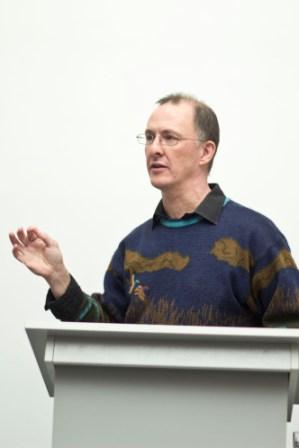
The leading forensic entomologist in Africa, Professor Martin Villet is one of the highly productive academics at Rhodes University, in his 23 years career in entomological and related research, he has produced 119 publications in referred journals, 11 book chapters, 123 conference presentations and a range of technical reports, online resources, edited proceedings and book reviews.
Prof Villet is an internationally recognised and highly valued expert in insect systematics, evolution and biology, and is universally acknowledged in his field as a scholarly expert in medical and forensic entomology.
His scholarly work was recognised when he was awarded Vice-Chancellor’s Distinguished Senior Research Medal, for his sustain scholarly reputation across a wide range of intellectual rigorous pursuit.
Delivering his Vice-Chancellor’s Senior Researcher’s Award lecture recently, he spoke about his research methods as “searching for explanations, not just descriptions or narrative”.
He finds that people often ask him, what are insects good for? To which he may explain, after giving some examples, “It’s possible that God did it but I can tell you this is how God did it.”
Presenting an entertaining lecture to mark the occasion he explored some of the various aspects of his research in his lecture entitled “Of Ants and Cicadas: Thinking and Doing”. Prof Villet interweaved images and stories of La Fontaine’s fable of the ant and the cicada.
He discussed how they behave in the insect world. He elaborated on new discoveries of how some ants feed from their young by tapping a gland on the grub’s stomachs.
He also spoke of the amazing discovery that cicadas produce two types of sperm – with the smaller, sub-standard variety getting in the way of subsequent males’ sperm, thus giving the healthy sperm a better chance of fertilising the female first.
In comparing two ways of approaching knowledge, he says the first mode is centred on discipline-based research (considered as the more traditional method) and the second is interdisciplinary, constructed around solving problems and is considered more uncommon at universities.
Emphasising how this is changing, he says: “If you are in a sufficient position to explain a phenomenon, you are capable of managing it and your level of personal security increases. Knowledge improves the quality of life.”
Prof Villet’s approach to teaching and research was aptly illustrated with how, with abundant enthusiasm, he shared some of his students’ research (both past and present) with his audience, accompanied by photos of the students. This put the spotlight on the students’ accomplishments rather than his own and speaks volumes of the trust and camaraderie between mentor and student.
He particularly encourages students to publish articles as soon as they can, both in journals and in the media.
“There’s no reason why third year projects can’t be published if the student is competent,” he says, adding that “It’s not about training, it’s about educating individuals for the life to follow.”
He believes that this goes hand in hand with being responsible for one’s actions as a scientist, being sensitive about the implications of stem cell research and nuclear energy for example.
Going against the common assumption that young people are apathetic about learning, he says: “I have found that if you give students the right encouragement, they will do almost anything.”
Touching on the aspects of science that still hold a certain mystery, he quotes Arthur C Clarke who said: “Any sufficiently advanced technology is indistinguishable from magic.”
Prof Villet has recently been named an Honorary Research Associate at the South African Institute of Aquatic Biodiversity (SAIAB) and spoke warmly of his colleagues at Rhodes and all over the world.
Deputy Vice-Chancellor of Research and Development, Dr Peter Clayton described Prof Villet as a person of wide and diverse interests, who published his first paper in his third year studying Zoology at Wits University.
He went on to publish another 10 during his PhD research on the division of labour in primitive ants, a subject which still sparks a deep interest in him.
Regarded as one of the foremost forensic entomologists in South Africa, he has named over 40 species of insects and a family of snakes alongside his students.
Rhodes eResearch Repository: http://eprints.ru.ac.za/3815/
By Anna-Karien Otto
Picture by Sara Garrun
